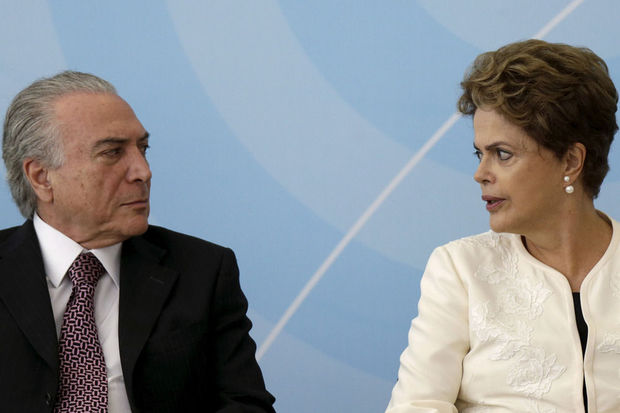Brazil: The Billion Dollar Coup

Brazilian President Dilma Rousseff was removed from office through a well-organized, carefully planned operation among the corrupt Brazilian political elite, closely linked to the stock-market, financial institutions and foreign energy companies. This ‘legislative coup d’état ’eliminated the democratically-elected ‘political intermediaries’ and installed a regime directly controlled by the CEO’s of leading multi-nationals. The corporate composition of the post-coup regime insured there would be a radical restructuring of the Brazilian economy, with a massive shift from wage support, social spending and public ownership toward profits, a foreign capital take-over of strategic sectors and foreign-domestic elite dominance over the entire economy.
This paper will describe the socio-economic dynamics of the coup and its aftermath, as well as the strategy and program that Brazil’s new rulers will pursue. In the second half of the paper, we will discuss the Workers Party regimes’ policies (under Lulu and Rousseff) that prepared the political and economic ground-work for the right-wing seizure of power.
Socio-Economic Dynamics of the Coup
The overthrow of President Rousseff was organized and implemented by Brazil’s capitalist class for its benefit, even though it had the superficial appearance of a power grab by corrupt politicians.
Rousseff’s Vice-President, Michel Temer (image: above with Dilma), acted as the front-man on behalf of the major investment banks: They set the agenda; he played his part.
Moreover, the principal beneficiaries of the economic giveaways under ‘President’ Temer, most notably the privatization of the energy sector, are clearly foreign capitalists. Once the coup makers lined up the votes among Brazil’s notoriously corrupt Congressmen to oust Rousseff, the multinational corporations emerged from the shadow of the stock market to take control over the levers of power.
In the run-up to the coup, when the so-called ‘impeachment’ was gaining momentum, the shares of the largely state-owned oil company sky-rocketed by 70%. In anticipation of the privatization and sell-off of assets, leading speculators and overseas investment houses seized the moment.
The ‘coup’ was no ‘secretive conspiracy’ – it was an overt, direct capitalist seizure of power. Once installed, it proceeded to dismantle the public sector economy and transfer the jewels of Brazil’s economy to foreign multi-nationals.
Master of Pillage
To ensure that the coup would not deviate from the course set by the capitalist coup-masters, Pedro Parente, ‘one of their own’ and the former head (CEO) of the giant agricultural trader, Bunge, was put in charge of the economy. With dizzying speed, Parente imposed the New Order onto the puppet Temer coup regime. He used a set of phony ‘technocratic’ euphemisms to explain the ongoing plunder of Petrobras, the state oil company.
Parente lowered Petrobras’ public investment sector by 25%, which he called ‘debt reduction’. The brutal programed sell-off of Petrobras’ most valuable assets was described as a ‘deleverage timetable’.
The unelected ‘Privatization Czar Parente’, in effect, ended the state’s role in the Brazilian economy by placing it under the exclusive dictates of private capitalist. The primary beneficiaries will prove to be foreign over national capital.
Parente has undermined the competitiveness of the national manufacturing sector and transport system with a hefty increase in domestic fuel prices. On the surface, he claimed the price increase would ‘raise profits for Petrobras’, obscuring the fact that the oil giant’s public assets had been given over to private capitalists. Meanwhile, Parente privatized the gas stations, ethanol production and distribution, as well as the billion-dollar fertilizer and petro chemical industry. Over $15 billion worth of Brazilian prime public assets were sold off to private, mostly foreign capital, in 2015-2016.
Parente’s onslaught deepened. The ‘grand prize’ was access to its rich off-shore oil fields. By the middle of 2016, a large-scale offshore oil license was sold to the Norwegian multi-national, Statoil, for a mere $2.5 billion.
With Parente in command, the ruling elite is on track to sell-off an additional $20 billion worth of Petrobras assets to foreign capital in 2017-18. The key goal has been to replace the state sector as lead operator in the deep water oil and gas fields.
The ongoing pillage of the Brazil’s huge state energy sector, is only the first course in an orgy of privatization: Infrastructure, transport, utilities and basic state-protected industries are on the chopping block. This private plunder of the state economic jewels accompanies a brutal slashing of public pensions, salaries and wages guarantees as well as public sector budgets for health and education and public workers. In order to reduce corporate taxes, increase profits and attract capital, the coup regime has ordered the cuts by fiat.
Conclusion: Challenges to Capitalist Power
The capitalist class seized state power through the corrupt political and judicial machinations of Brazil’s Vice President and Congressional cronies. The take-over was based on a series of alleged corruption scandals by the Workers Party. The fact that the entire Brazilian congress, most notably the capitalist operatives behind the coup, has been deeply immersed in the scandal over an alleged $15 billion looted from Petrobras,undermines their credibility. In fact, the ousted President Rousseff was cleared of all charges of corruption, while her successor faces ongoing investigations. This tragic comedy exposes that some members of the Workers Party are tiny amateurs in this orgy of capitalist plunder.
The current President Michel Temer is charged with receiving bribes from private contractors. If these investigations undermine his already dubious leadership, the capitalist coup-masters will be forced to call for early election. This will introduce considerable uncertainty about the viability of Privatization Czar Parente’scapitalist power grab.
The regime’s ‘slash and burn’ campaign against wages and pensions has heightened class conflicts within Brazil. The three major labor confederations are preparing for major strikes against a regime of questionable legitimacy.
The business coup has allowed the capitalist class to seize state power and decree its agenda. However it has yet to show it can directly impose its draconian polices aimed at reconcentrating wealth and income for the top five percent while repressing scores of millions of industrial workers, rural landless laborers and the urban poor.
In addition, while the rulers can offer the jewels of Brazil’s economy to foreign capital, the current low oil prices, ongoing corruption trials at the highest level of elite power and intensifying class conflicts will undermine their ability to implement their agenda. Indeed the prospect of escalating state repression and criminal gang violence may persuade foreign capitalists to skim off the top of Brazil’s most profitable assets and abandon the ensuing chaos.
Epilogue
After 13 years of Workers Party control of the Brazilian presidency, how did the coup-masters rise so quickly and decisively? The political leader of the coup was Vice President Michel Tener, who had been selected by the Workers Party (PT) leadership as part of their ‘coalition strategy’ of working with the most corrupt elements of the Brazilian capitalist class. The members of the Congressional majority, which voted to impeach President Rousseff, were in partnership with the PT, elected in joint election platforms. The economic decline and recession, which undermined public support for the PT government, was a result of its emphasis on the ‘boom and bust’ commodity strategy. The strategic role played by the private banking and business sector in the ‘legislative coup’ resulted from the PT’s decision to implement the privatizations started by the previous regime of President Cardoso, thus strengthening this parasitic class.
Above all, it was the PT’s new reliance on financing their political campaigns through the donation of contractors and the business elites, instead of combining electoral politics with class warfare and mass struggle that opened the Party to the everyday corrupt practices of the capitalist parties. It is a perverse justice that only the PT newcomers to political corruption would be caught and prosecuted!
In other words’ the PT continued to win elections by becoming a normal bourgeois party with its social welfare agenda reliant on an unstable capitalist growth cycle of commodity exports. The PT were profoundly mistaken when they saw their alliance with the capitalist class as something permanent rather than an ‘alliance of convenience’ where the business elite would tolerate them until it was in a position to overthrow them.


